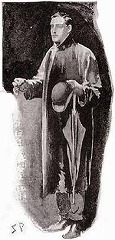
The man who entered was young, some two-and-twenty at the outside, well-groomed and trimly clad, with something of refinement and delicacy in his bearing. The streaming umbrella which he held in his hand, and his long shining waterproof told of the fierce weather through which he had come. He looked about him anxiously in the glare of the lamp, and I could see that his face was pale and his eyes heavy, like those of a man who is weighed down with some great anxiety.
“I owe you an apology,” he said, raising his golden pince-nez to his eyes. “I trust that I am not intruding. I fear that I have brought some traces of the storm and rain into your snug chamber.”
“Give me your coat and umbrella,” said Holmes. “They may rest here on the hook and will be dry presently. You have come up from the south-west, I see.”
“Yes, from Horsham.”
“That clay and chalk mixture which I see upon your toe caps is quite distinctive.”
“I have come for advice.”
“That is easily got.”
“And help.”
“That is not always so easy.”
“I have heard of you, Mr. Holmes. I heard from Major Prendergast how you saved him in the Tankerville Club scandal.”
“Ah, of course. He was wrongfully accused of cheating at cards.”
“He said that you could solve anything.”
“He said too much.”
“That you are never beaten.”
“I have been beaten four times - three times by men, and once by a woman.”
“But what is that compared with the number of your successes?”
“It is true that I have been generally successful.”
“Then you may be so with me.”
“I beg that you will draw your chair up to the fire and favour me with some details as to your case.”
“It is no ordinary one.”
“None of those which come to me are. I am the last court of appeal.”
“And yet I question, sir, whether, in all your experience, you have ever listened to a more mysterious and inexplicable chain of events than those which have happened in my own family.”
“You fill me with interest,” said Holmes. “Pray give us the essential facts from the commencement, and I can afterwards question you as to those details which seem to me to be most important.”
The young man pulled his chair up and pushed his wet feet out towards the blaze.
“My name,” said he, “is John Openshaw, but my own affairs have, as far as I can understand, little to do with this awful business. It is a hereditary matter; so in order to give you an idea of the facts, I must go back to the commencement of the affair.
“You must know that my grandfather had two sons - my uncle Elias and my father Joseph. My father had a small factory at Coventry, which he enlarged at the time of the invention of bicycling. He was a patentee of the Openshaw unbreakable tire, and his business met with such success that he was able to sell it and to retire upon a handsome competence.